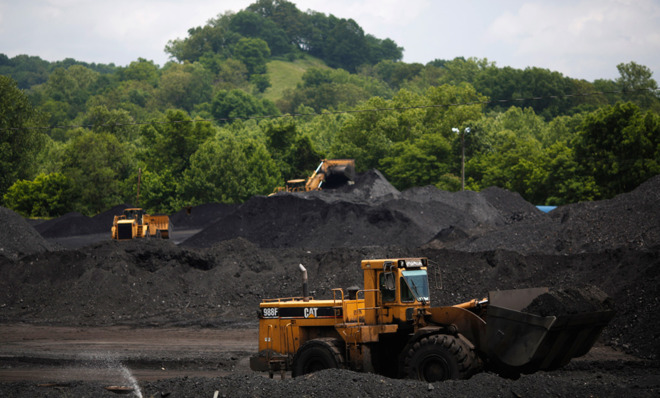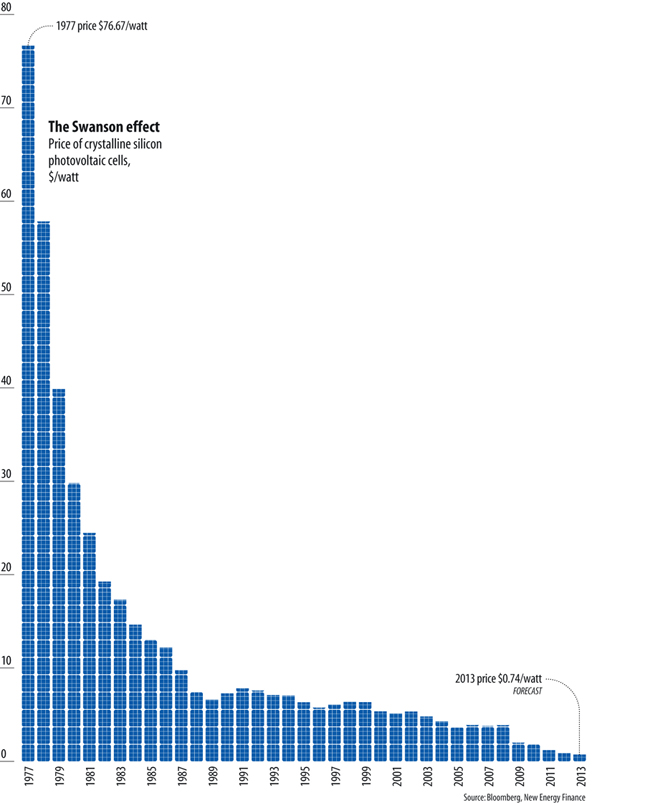Obama isn't killing coal. It's dying anyway.
New evidence shows that coal is being eclipsed by solar in a big way

A free daily email with the biggest news stories of the day – and the best features from TheWeek.com
You are now subscribed
Your newsletter sign-up was successful
The Obama administration last month debuted a tough new environmental regulatory proposal that aims to reduce U.S. carbon dioxide emissions by 30 percent by 2030 from 2005 levels. The main mechanism for that reduction will be emissions limits on coal-fired power plants.
The proposal has won praise from environmentalist groups, not least because it indicates that the U.S. government is finally getting serious about the delicate (and politically unpopular) subject of climate change. But the proposal has led many, particularly conservatives and members of the energy industry, to label the president a job-killing "coal killer."
But here's the truth: coal power is dying off anyway.
The Week
Escape your echo chamber. Get the facts behind the news, plus analysis from multiple perspectives.

Sign up for The Week's Free Newsletters
From our morning news briefing to a weekly Good News Newsletter, get the best of The Week delivered directly to your inbox.
From our morning news briefing to a weekly Good News Newsletter, get the best of The Week delivered directly to your inbox.
That might seem like a strange claim. After all, coal power usage is still growing globally, according to a report by the energy firm BP, and renewable energy still only makes up less than 5 percent of global energy consumption.
But the times they are a-changin'. Last year, I argued that the world was on the cusp of a solar energy boom, because the price of solar was falling so fast that it would soon be as cheap as conventional electricity. It turns out that has happened even faster than anyone could have expected.
As The Guardian's Giles Parkinson points out, solar has become so cheap in Australia that coal would be more expensive even if it were free, due to the power transmission and retail charges:
[L]et’s imagine that the wholesale price of electricity fell to zero and stayed there, and that the benefits were passed on to consumers. In effect, that coal-fired energy suddenly became free. Could it then compete with rooftop solar?
The answer is no. Just the network charges and the retailer charges alone add up to more than 19c/kWh, according to estimates by the Australian energy market commissioner. According to industry estimates, solar ranges from 12c/kWh to 18c/kWh, depending on solar resources of the area, Those costs are forecast to come down even further, to around 10c/kWh and lower.
Coal, of course, will never be free. [The Guardian]
That's why the Australian government and private groups such as Bloomberg New Energy Finance forecast solar generation to rise six-fold over the next decade.
A free daily email with the biggest news stories of the day – and the best features from TheWeek.com
Of course, Australia is one of the sunniest places on Earth, so it's not surprising that it is leading the world in terms of solar affordability. But it's not just Australia. In other countries, including Spain and Germany, solar for the first time became just as cheap as conventional electricity this year.
There's also more to solar than falling costs: improved batteries and other storage technologies are finally making solar a viable option for the mainstream, especially for parts of the world that still don't have a conventional electricity grid. As The Wall Street Journal's Claudia Assis writes:
The demise of the traditional business model of power companies could happen sooner than expected, as solar power plus power storage will combine to make the electrical grid optional for many customers. [WSJ]
Some argue that these falling solar energy costs are a temporary blip, and that solar's current cheapness is a product of government-subsidized Chinese firms dumping solar panels onto the market for little or no profit. But that misses the forest for the trees. Solar panel manufacturing costs are not static, and the historical record of falling prices shows that the key factor is improving technology, not profit margins. Here's what happened to solar costs from the 1970s to 2013 (solar costs have fallen even more since):

(Bloomberg New Energy Finance)
And with increased investment in solar panel and battery technology from a large array of firms — including Tesla, Apple, Intel, Google, and Walmart — the technology will continue to improve and bring down costs, similar to the way computers and flat-screen TVs have become cheaper over the years as the manufacturing process has become more efficient and productive.
So with or without Obama's new coal emissions cap, burning coal for power will at least be in serious decline by 2030 — if not on the verge of extinction.
John Aziz is the economics and business correspondent at TheWeek.com. He is also an associate editor at Pieria.co.uk. Previously his work has appeared on Business Insider, Zero Hedge, and Noahpinion.
-
 Why are election experts taking Trump’s midterm threats seriously?
Why are election experts taking Trump’s midterm threats seriously?IN THE SPOTLIGHT As the president muses about polling place deployments and a centralized electoral system aimed at one-party control, lawmakers are taking this administration at its word
-
 ‘Restaurateurs have become millionaires’
‘Restaurateurs have become millionaires’Instant Opinion Opinion, comment and editorials of the day
-
 Earth is rapidly approaching a ‘hothouse’ trajectory of warming
Earth is rapidly approaching a ‘hothouse’ trajectory of warmingThe explainer It may become impossible to fix